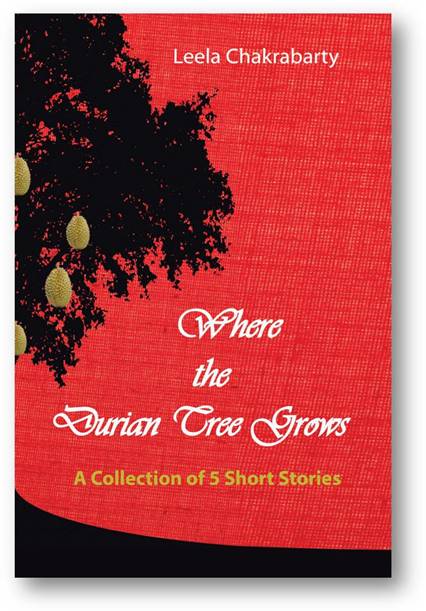Where the Durian Tree Grows by Leela Chakrabarty PPT
ABOUT ME
February 11, 2016
December 10, 2015
Leela Chakrabarty – Malaysia Book Author: Contact Details, Books, Biography http://www.pubmatch.com/profile/20981/leela-chakrabarty.html
November 18, 2015
Let’s discuss the poem –“Newsbreak” by Max Fatchen
News Break
Now why so loving, darling,
And why the sudden kiss?
You’d help me with some little jobs?
For goodness sake, what’s this?
Your face is clean for once, dear,
Your clothes without a crease.
You saved your luncheon money?
Will wonders never cease?
No dropping of your school books,
No shrieking, childish treble.
Today you are a lamb, love,
Where yesterday a rebel.
But surely you’re some stranger,
No rage or hullabaloo.
Come closer, let me look, dear,
Can this be REALLY you?
Now were you struck by lightning
Or were you stunned at sport?
Ah … now I see the reason.
You’ve brought your school report!
– Max Fatchen
In the first stanza, the parent is wondering why his child’s behaviour is suddenly so loving.The child even gives a kiss to the parent and the parent is bewildered that the child offers help. The parent desperately wants to know the reason for the sudden change.
In the second stanza, the parent is surprised to see the child’s face neat and tidy. The child’s clothes are also neat as if it has been ironed and has no crumples. The parent is also shocked to know that the child did not spend his money for lunch that day as he usually does. The parent is astonished with all the surprises that he is getting and thinks when it would all end.
In the next stanza or stanza 3, the parent is surprised that his child did not drop his school books as he returns home. The child does not scream or show an outburst of anger. The parent praises the child for his good behaviour that day as the child acts like a gentle lamb when just the previous day, the child was going against his parent.
In stanza 4, the parent feels as if the child is a stranger to him – like a new person.
The child does not show any anger or any emotional disturbance. Therefore, the parent asks the child to come closer so that he can see his child better as he wonders if that is really his child.
That brings us to the last stanza, stanza five, where he also wonders whether his child had been struck by lightning or injured during sports that has made him temporarily unable to react. Finally, he understands the real reason for the change as he noticed that the child has brought his school progress report.
Point Of View
The first person point of view is used
Setting
The setting is in a house.
Theme
Honesty is the best policy – We should be honest with our parents. We must tell them the truth so that we can gain respect and trust from them. Without trust, life would be miserable. Parents will become suspicious in everything we do. This would lead to arguments and lack of trust. It is more effective if the child behaves in honest and productive ways. Learning to be honest and eliminating the need for lies can help to clean up one’s conscience and his relationship with others
Moral Value
Honesty – It is a very important virtue. Speak from your heart and tell the truth. Do not be bothered even though it would make you feel bad. People respect honesty, even when the truth is uncomfortable.
Tone
The persona is surprised and astonished with the child’s behaviour. The poem creates a reflective mood as the persona compares the child’s past and present behaviour. Overall, it is light-hearted and a little humorous.
Metaphors
The poet uses metaphor to describe the behaviour of the child. ‘Today you’re a lamb’ which shows innocence and obedience when the child is compared to a lamb; and ‘Where yesterday a rebel’ which shows disobedience and defiance when the child is said to be a rebel (lines 11 and 12)
Structure, Style and Language
The poem consists of 5 stanzas with four lines and the rhyme scheme is ‘a, b, c, b’. The style is simple and direct. The language and choice of words used is easy to understand as we can relate it to what a child does.
The Title
News Break means reporting something that is unusual. The title is used to indicate that the boy is doing something unusual by showing a change in his behaviour.
DISCUSSION
The words “News Break” are usually associated to important events in one’s life. In this poem, the child is afraid to tell the parent about his result. Instead of telling the parent, he started to behave differently by being nice to make up to the bad news. The child realises that his report card may not please the parent. Hence, he tries to be extra nice so that the parent will not be angry. The poem demonstrates what a small child has to do just to please his parents before the parents take any action against him. He also tells us the fear he is undergoing when things do not turn out as they are supposed to. The poet has observed the trauma a child faces before he hands over his progress report to his parents. The job of the poet is to voice the actions of the small child to gain credit from his parents so that there would be no shelling from their parents.
November 18, 2015

Do get a copy- you may get it here at google play.google.com/…/Leela_Chakrabarty_Where_the_Durian_Tree_Grows
Also available at Amazon.com amazon.com/…tion/dp/1482853639/ref=sr_1_1
and Barnes and Noble barnesandnoble.com/…hakrabarty/1122824054
January 4, 2014
The WordPress.com stats helper monkeys prepared a 2013 annual report for this blog.
Here’s an excerpt:
The Louvre Museum has 8.5 million visitors per year. This blog was viewed about 230,000 times in 2013. If it were an exhibit at the Louvre Museum, it would take about 10 days for that many people to see it.
Click here to see the complete report.
January 4, 2011

ASenior Lecturer in the English Language and Literature Department, Faculty of Languages and Communication,Sultan Idris University of Education, Tanjung Malim, Perak . I have more than 30 years of teaching experience and have written for both genres; fiction and non-fiction. I have a certificate in general translation from ITNM (Malaysian National Translation Institute) and have recently completed an International Postgraduate Certificate Course in Learning and Teaching in Higher Education from Roehampton University, London, UK. I am currently pursuing for my doctoral degree.I also write books for secondary schools especially write notes for the literature section. One proud moment in my life is when I co-authored the EST textbook used for Form 4 and 5.




